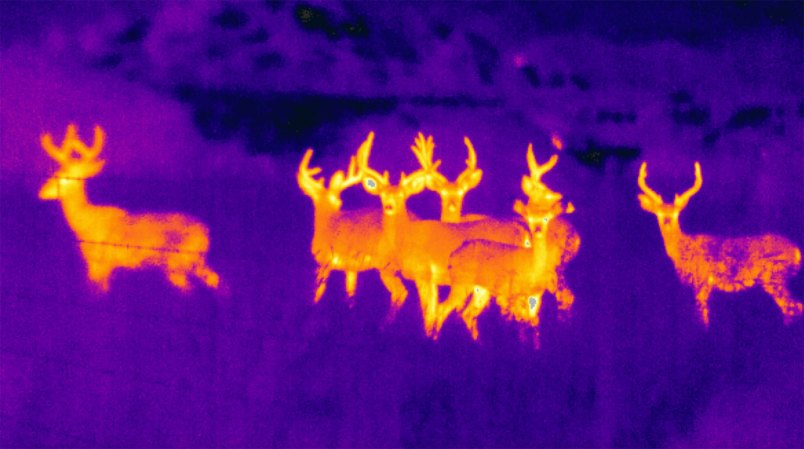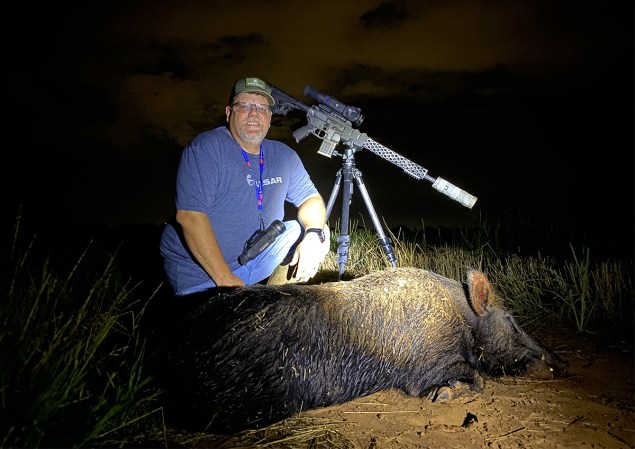We may earn revenue from the products available on this page and participate in affiliate programs. Learn More ›
The U.S. State Department earlier this month slapped sanctions on a Chinese company affiliated with at least one provider of commercial thermals in the U.S. It’s unclear whether the penalties will affect availability of the increasingly popular electronic sights and viewers.
Chinese company Yantai IRAY Technology Co. LTD is among the nearly 300 entities and individuals that the U.S. government claims has aided Russia’s military, in violation of trade embargoes designed to punish Russia for what it calls aggression against Ukraine. While Yantai IRAY Technology Co., which makes optics and sights for tanks and armored vehicles, and InfiRay Outdoor, which makes thermal scopes and hand-held devices for the civilian recreation market, are members of the same holding group, they are separate entities.
The distinction is important because the American company, Texas-based iRayUSA, has been improperly linked to the State Department sanctions, says Angelo Brewer, operations manager for iRayUSA.
“iRayUSA has a supplier relationship with InfiRay Outdoor, but it has no relationship with Yantai IRAY Technology Co., the business that has been sanctioned,” says Brewer. He says iRayUSA is owned and operated entirely by U.S. citizens and which distributes InfiRay Outdoor’s thermal riflescopes, hand-held viewers, and even vehicle-mounted thermal devices.
Brewer noted that the similarity of names, as well as the fact that iRayUSA distributes only products manufactured by InfiRay Outdoor, has sown confusion following the May 2 State Department sanctions. The government notes that Yantai IRAY is a “PRC-based supplier of Tier 3 and Tier 4 items” on the Bureau of Industry and Security’s “Common High Priority List to Russian-based end-users.”
The Associated Press reported in April that Yantai IRAY Technology Co., LTD was among the Chinese firms that had supplied Russia “with military optics for use in tanks and armored vehicles manufactured by Chinese firm North China Research Institute of Electro-Optics.” Federal investigators confirm that IRAY Technology Co. supplied tank-mounted thermal sights to Russian-based end-users. “One of the Russian-based companies that received components from IRAY markets military thermal imagers, including IRAY’s products,” according to the State Department. Penalties for violating rules that prohibit trade with Russia’s military include monetary fines “ranging from a few thousand dollars to several millions and/or prison time up to 30 years,” according to Dow Jones.
But iRayUSA’s Brewer says the U.S. company is “uninvolved in the cause of the recent sanctions.”
“Neither iRayUSA nor InfiRay Outdoor were sanctioned,” he says, adding “that seems to be the most intentionally or unintentionally point missed in this whole process, much to the chagrin of our competitors.”
Brewer noted that InfiRay Outdoor produces thermals and related devices only for the consumer and recreational markets and does not manufacturer or distribute products for military use.
The commercial market for thermal sights and devices is increasingly competitive, as more players enter the market and as more products become available to U.S. consumers. Some U.S. retailers report that sales of thermal devices are equal to or exceeding those of traditional optics.
But the market, as well as ownership stakes of various companies, is also murky. Thermal users may notice performance similarities between devices sold by different brands, often because they share internal components, including sensors and “thermal cores.” These cores are manufactured by only a few companies, including some affiliated with InfiRay Outdoor. Whether this secondary OEM (original equipment manufacturer) market will be affected by the State Department sanctions is unclear.
But one of InfiRay’s competitors, which also incorporates thermal cores produced by an IRAY affiliate in their thermal devices, says the sanctions are problematic.
“Our internal compliance officers have flagged our relationship with the IRAY company that produces these thermal cores and advised us to find another vendor,” says the director of a thermal company who spoke on condition of anonymity. “The concern is that the sanctions list is tied back to the International Traffic in Arms Regulations (ITAR), and once you get blacklisted there, you can lose a lot of business in parts of your company that don’t have anything to do with thermals, or even with sports optics.”
The executive said that his company has followed the State Department’s lead and “determined that these business entities are too interconnected. We don’t care which shell games they’re playing, we made a determination that we’re not going to do business with companies that are supplying product to Russia.”
The State Department’s May 2 action, which is authorized by Executive Order 14024, sanctioned more than 280 individuals and entities in order “to impose additional costs on Russia for both its foreign aggression and internal repression.” Another 80 entities and individuals were sanctioned for their involvement in development of Russia’s “future energy, metals, and mining production and export capacity” and three individuals were specifically named in the sanctions for their alleged roles “in connection with the death of Aleksey Navalny in Russian Penal Colony IK-3.” Navalny was a prominent Russian dissident who challenged the authority of Russian president Vladimir Putin and was later sentenced to a Siberian penal colony where he died in February.
Chilling Effect?
Some retailers and distributors of thermals worry that the Yantai IRAY sanctions could cool a red-hot thermal market.
“One of the reasons American customers are able to buy thermal devices for under $3,000 is because companies are buying thermal cores on the OEM market,” said one distributor who asked not to be named. “If one of the big suppliers of these cores goes away, prices will go up and availability will go down.”
But in a letter to its distributors released earlier this month, iRayUSA stressed that its U.S. operations remain unaffected by the Office of Foreign Assets Control (OFAC) sanctions.
“These sanctions are imposed to restrict certain technology from flowing to Russia and reduce its ability to wage war against Ukraine,” the letter stated. “Among the entities named in these sanctions is Yantai IRAY Technology Company Ltd. iRayUSA’s manufacturing partner is a separate entity and is uninvolved in the cause of the above sanctions. iRayUSA’s business in distributing the InfiRay Outdoor Brand is only in the commercial market in the United States of America.”
The letter added that iRayUSA is consulting with the federal Office of Foreign Assets Control, and “at this time based on our conversations with OFAC and outside counsel the above sanctions have no negative impact whatsoever on sales, shipments, or any other part of our business including our industry-leading warranty and after-sales support.”
The company noted to its distributors that “iRayUSA is dedicated to delivering high performance thermal optics and is very excited about the future of the InfiRay Outdoor product line in the US market. I would also like to remind you that every dealer of our product is contractually bound to abide by US ITAR regulations.”
A correction was made on June 2, 2024: A previous version of this article incorrectly stated that Yantai IRAY is the parent company of iRayUSA. iRayUSA does not have a relationship with Yantai IRAY.









